Sir John Monash, Personal Files Book 11, 31 January - 29 February 1916, Part 13
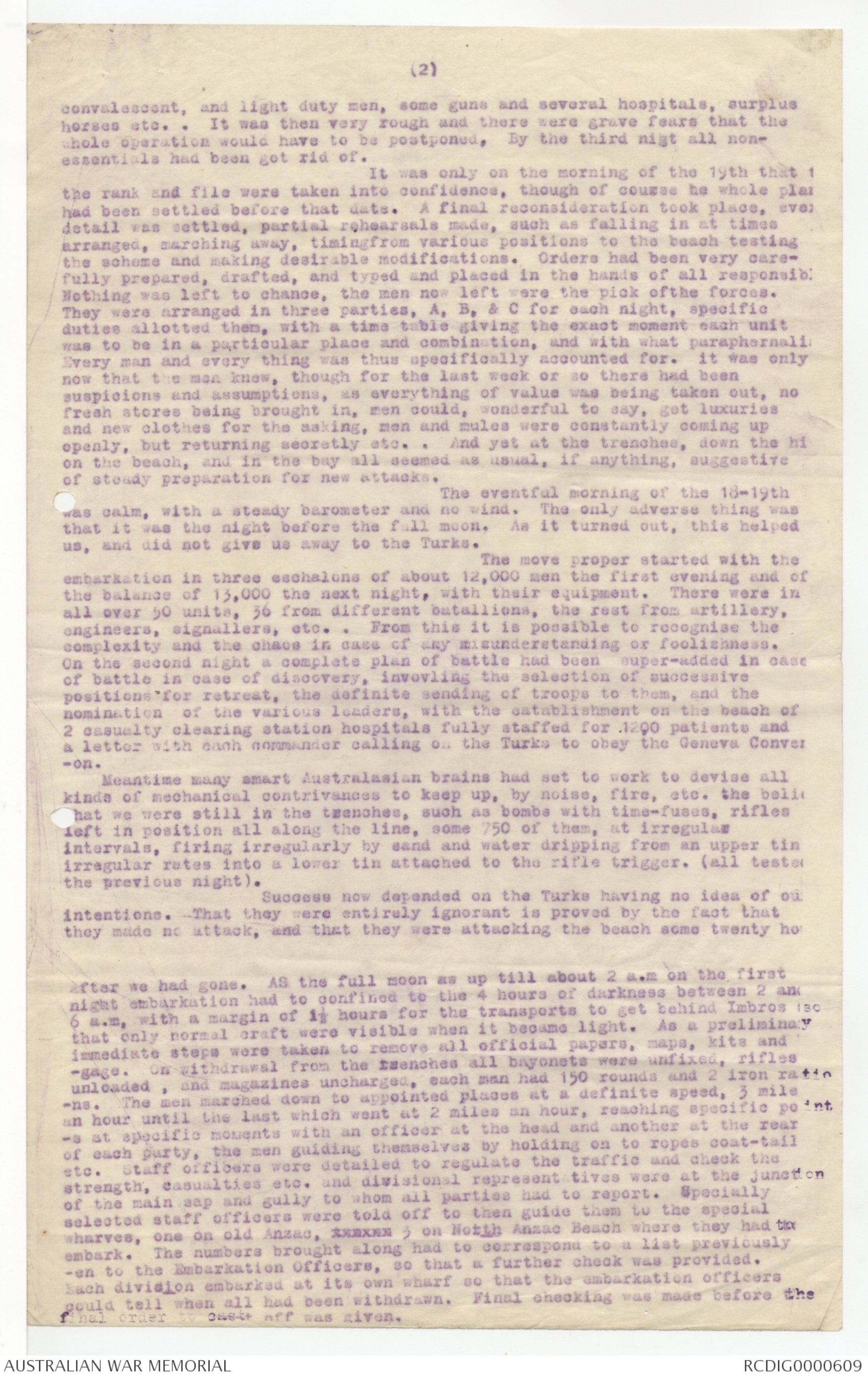
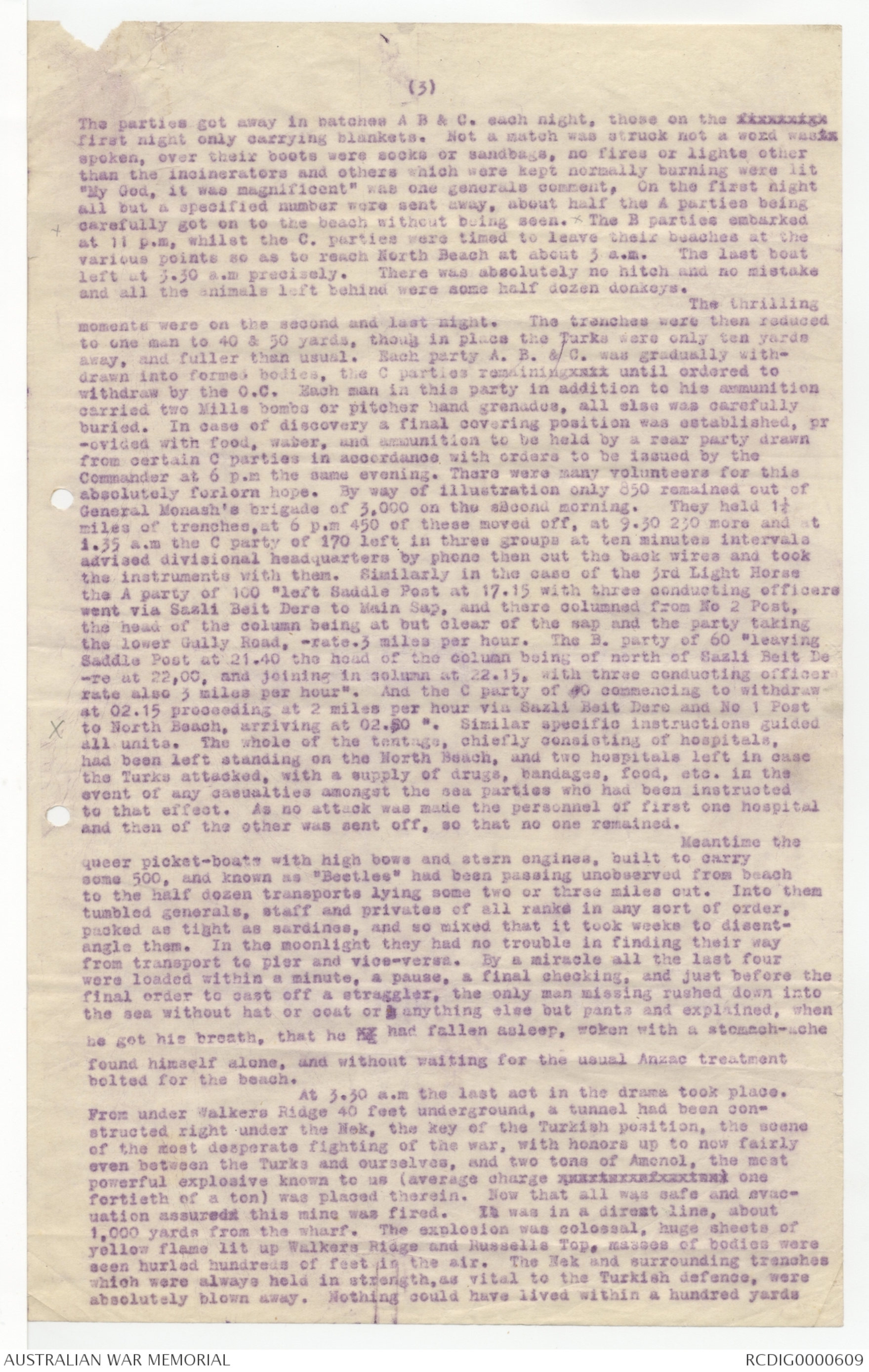
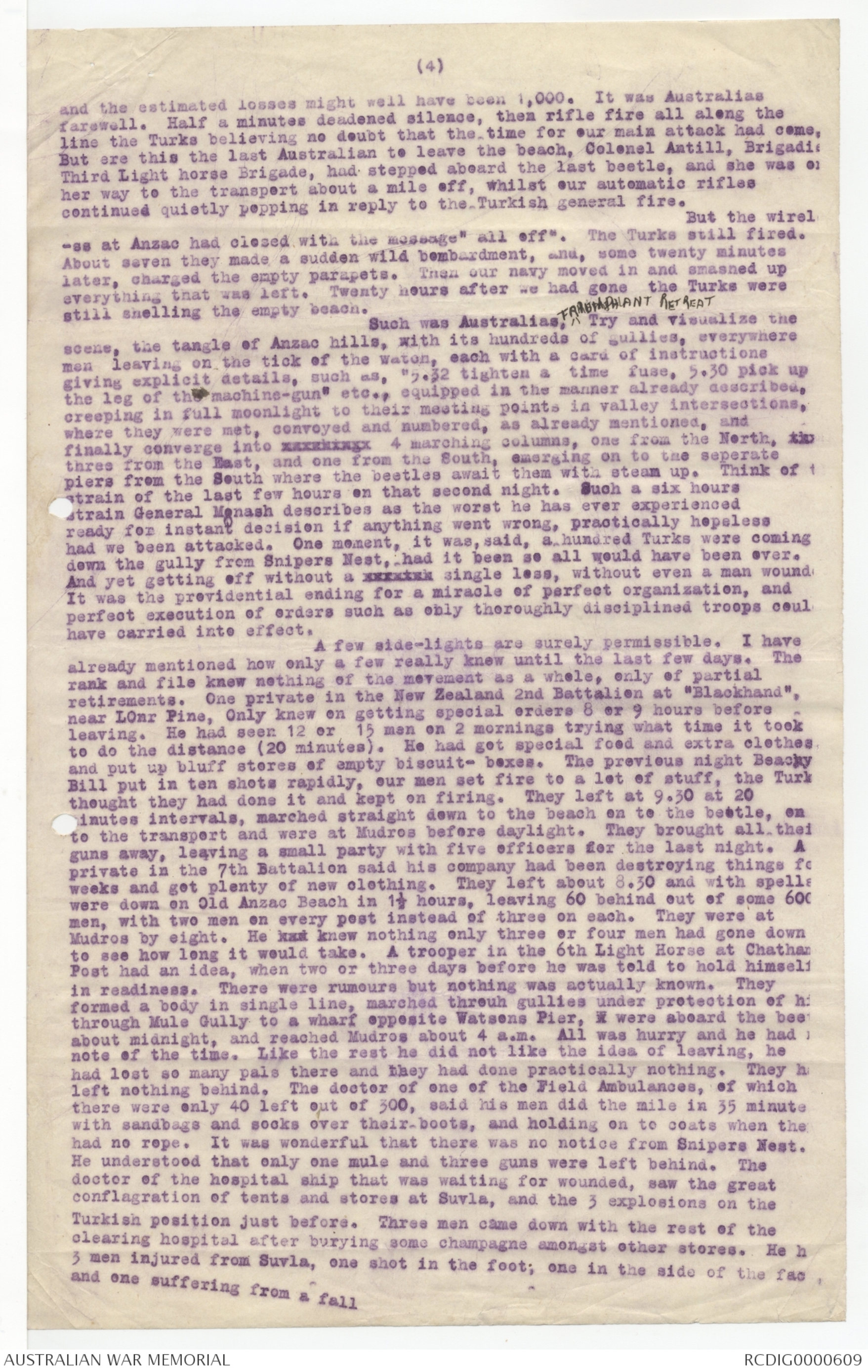
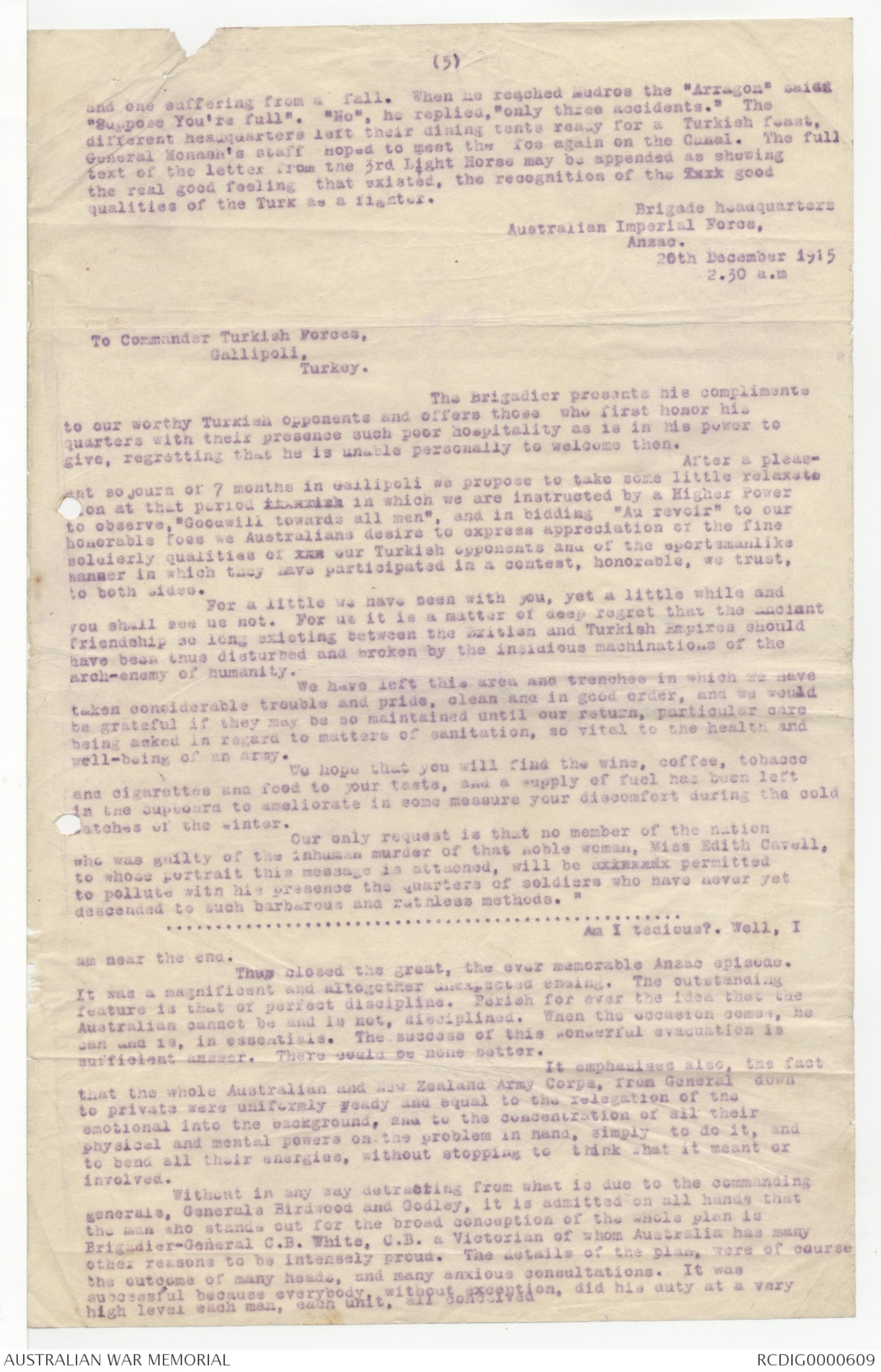
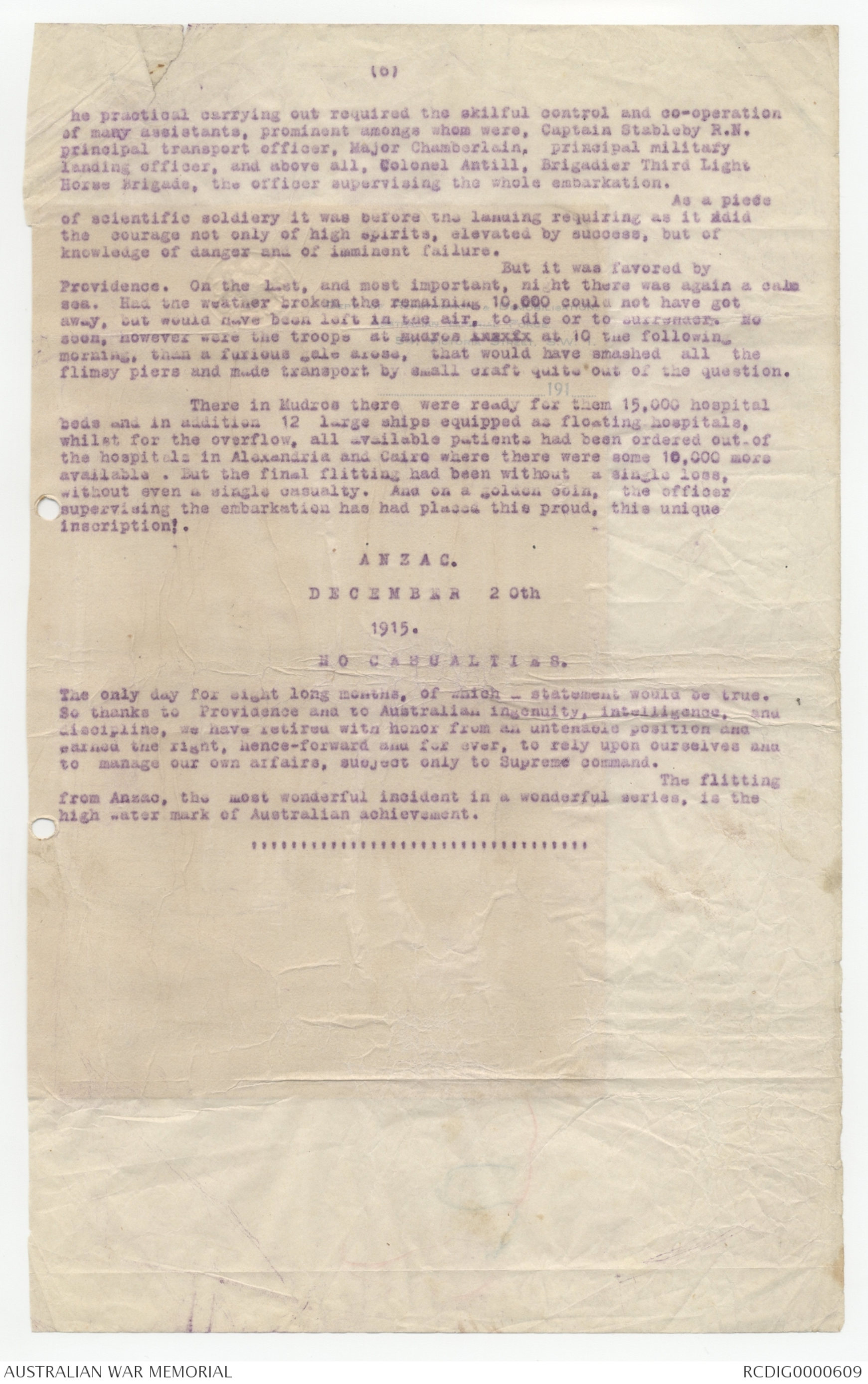
(2)
convalescent, and light duty men, some guns and several hospitals, surplus
horses etc. . It was then very rough and there were grave fears that the
whole operation would have to be postponed. By the third night all non-
essentials had been got rid of.
It was only on the morning of the 19th that I
the rank and file were taken into confidence, though of course he whole plan
had been settled before that date. A final reconsideration took place, every
detail was settled, partial rehearsals made, such as falling in at times
arranged, marching away, timingfrom various positions to the beach testing
the scheme and making desirable modifications. Orders had been very carefully
prepared, drafted, and typed and placed in the hands of all responsibl
Nothing was left to chance, the men now left were the pick ofthe forces.
They were arranged in three parties, A, B, & C for each night, specific
duties allotted them, with a time table giving the exact moment each unit
was to be in a particular place and combination, and with what paraphernalia
Every man and every thing was thus specifically accounted for. it was only
now that the men knew, though for the last week or so there had been
suspicions and assumptions, as everything of value was being taken out, no
fresh stores being brought in, men could, wonderful to say, get luxuries
and new clothes for the asking, men and mules were constantly coming up
openly, but returning secretly etc. . And yet at the trenches, down the hill
on the beach, and in the bay all seemed as usual, if anything, suggestive
of steady preparation for new attacks.
The eventful morning of the 18-19th
was calm, with a steady barometer and no wind. The only adverse thing was
that it was the night before the full moon. As it turned out, this helped
us, and did not give us away to the Turks.
The move proper started with the
embarkation in three eschalons of about 12,000 men the first evening and of
the balance of 13,000 the next night, with their equipment. There were in
all over 50 units, 36 from different batallions, the rest from artillery,
engineers, signallers, etc. . From this it is possible to recognise the
complexity and the chaos in case of any misunderstanding or foolishness.
On the second night a complete plan of battle had been super-added in case
of battle in case of discovery, invovling the selection of successive
positions for retreat, the definite sending of troops to them, and the
nomination of the various leaders, with the establishment on the beach of
2 casualty clearing station hospitals fully staffed for 1200 patients and
a letter with each commander calling on the Turks to obey the Geneva Convention.
Meantime many smart Australasian brains had set to work to devise all
kinds of mechanical contrivances to keep up, by noise, fire, etc. the belief
that we were still in the trenches, such as bombs with time-fuses, rifles
left in position all along the line, some 750 of them, at irregular
intervals, firing irregularly by sand and water dripping from an upper tin
irregular rates into a lower tin attached to the rifle trigger. (all tested
the previous night).
Success now depended on the Turks having no idea of our
intentions. That they were entirely ignorant is proved by the fact that
they made no attack, and that they were attacking the beach some twenty hours
after we had gone. AS the full moon as up till about 2 a.m on the first
night embarkation had to confined to the 4 hours of darkness between 2 and
6 a.m, with a margin of 1½ hours for the transports to get behind Imbros so
that only normal craft were visible when it became light. As a preliminary
immediate steps were taken to remove all official papers, maps, kits and
-gage. On withdrawal from the trenches all bayonets were unfixed, rifles
unloaded , and magazines uncharged, each man had 150 rounds and 2 iron rations.
The men marched down to appointed places at a definite speed, 3 mile
an hour until the last which went at 2 miles an hour, reaching specific points
at specific moments with an officer at the head and another at the rear
of each party, the men guiding themselves by holding on to ropes coat-tail
etc. Staff officers were detailed to regulate the traffic and check the
strength, casualties etc. and divisional representatives were at the junction
of the main sap and gully to whom all parties had to report. Specially
selected staff officers were told off to then guide them to the special
wharves, one on old Anzac, xxxxxx 3 on North Anzac Beach where they had to
embark. The numbers brought along had to correspond to a list previously
-en to the Embarkation Officers, so that a further check was provided.
Each division embarked at its own wharf so that the embarkation officers
could tell when all had been withdrawn. Final checking was made before the
final order to cast off was given.
(3)
The parties got away in batches A B & C. each night, those on the xxxxxxxxxx
first night only carrying blankets. Not a match was struck not a word wasxx
spoken, over their boots were socks or sandbags, no fires or lights other
than the incinerators and others which were kept normally burning were lit
"My God, it was magnificent" was one generals comment, On the first night
all but a specified number were sent away, about half the A parties being
carefully got on to the beach without being seen. x The B parties embarked
at 11 p.m, whilst the C. parties were timed to leave their beaches at the
various points so as to reach North Beach at about 3 a.m. The last boat
left at 3.30 a.m precisely. There was absolutely no hitch and no mistake
and all the animals left behind were some half dozen donkeys.
The thrilling
moments were on the second and last night. The trenches were then reduced
to one man to 40 & 50 yards, though in places the Turks were only ten yards
away, and fuller than usual. Each party A. B. & C. was gradually withdrawn
into formed bodies, the C parties remainingxxxx until ordered to
withdraw by the O.C. Each man in this party in addition to his ammunition
carried two Mills bombs or pitcher hand grenades, all else was carefully
buried. In case of discovery a final covering position was established, provided
with food, water, and ammunition to be held by a rear party drawn
from certain C parties in accordance with orders to be issued by the
Commander at 6 p.m the same evening. There were many volunteers for this
absolutely forlorn hope. By way of illustration only 850 remained out of
General Monash's brigade of 3,000 on the second morning. They held 1¼
miles of trenches, at 6 p.m 450 of these moved off, at 9.30 230 more and at
1.35 a.m the C party of 170 left in three groups at ten minutes intervals
advised divisional headquarters by phone then cut the back wires and took
the instruments with them. Similarly in the case of the 3rd Light Horse
the A party of 100 "left Saddle Post at 17.15 with three conducting officers
went via Sazli Beit Dere to Main Sap, and there columned from No 2 Post,
the head of the column being at but clear of the sap and the party taking
the lower Gully Road, - rate.3 miles per hour. The B. party of 60 "leaving
Saddle Post at 21.40 the head of the column being of north of Sazli Beit Dere
at 22,00, and joining in column at 22.15, with three conducting officer
rate also 3 miles per hour". And the C party of 40 commencing to withdraw
at 02.15 proceeding at 2 miles per hour via Sazli Beit Dere and No 1 Post
to North Beach, arriving at 02.50". Similar specific instructions guided
all units. The whole of the tentage, chiefly consisting of hospitals,
had been left standing on the North Beach, and two hospitals left in case
the Turks attacked, with a supply of drugs, bandages, food, etc. in the
event of any casualties amongst the sea parties who had been instructed
to that effect. As no attack was made the personnel of first one hospital
and then of the other was sent off, so that no one remained.
Meantime the
queer picket-boats with the high bows and stern engines, built to carry
some 500, and known as "Beetles" had been passing unobserved from beach
to the half dozen transports lying some two or three miles out. Into them
tumbled generals, staff and privates of all ranks in any sort of order,
packed as tight as sardines, and so mixed that it took weeks to disentangle
them. In the moonlight they had no trouble in finding their way
from transport to pier and vice-versa. By a miracle all the last four
were loaded within a minute, a pause, a final checking, and just before the
final order to cast off a straggler, the only man missing rushed down into
the sea without hat or coat or x anything else but pants and explained, when
he got his breath, that he xx had fallen asleep, woken with a stomach-ache
found himself alone, and without waiting for the usual Anzac treatment
bolted for the beach.
At 3.30 a.m the last act in the drama took place.
From under Walkers Ridge 40 feet underground, a tunnel had been constructed
right under the Nek, the key of the Turkish position, the scene
of the most desperate fighting of the war, with honors up to now fairly
even between the Turks and ourselves, and two tons of Amonol, the most
powerful explosive known to us (average charge xxxxxxxxxxxxxxxxxxxx one
fortieth of a ton) was placed therein. Now that all was safe and evacuation
assuredx this mine was fired. It was in a direct line, about
1,000 yards from the wharf. The explosion was colossal, huge sheets of
yellow flame lit up Walkers Ridge and Russells Top, masses of bodies were
seen hurled hundreds of feet in the air. The Nek and surrounding trenches
which were always held in strength, as vital to the Turkish defence, were
absolutely blown away. Nothing could have lived within a hundred yards
(4)
and the estimated losses might well have been 1,000. It was Australias
farewell. Half a minutes deadened silence, then rifle fire all along the
line the Turks believing no doubt that the time for our main attack had come,
But ere this the last Australian to leave the beach, Colonel Antill, Brigadier
Third Light horse Brigade, had stepped aboard the last beetle, and she was on
her way to the transport about a mile off, whilst our automatic rifles
continued quietly popping in reply to the Turkish general fire.
But the wireless
at Anzac had closed with the message" all off". The Turks still fired.
About seven they made a sudden wild bombardment, and, some twenty minutes
later, charged the empty parapets. Then our navy moved in and smashed up
everything that was left. Twenty hours after we had gone the Turks were
still shelling the empty beach.
Such was Australias, ^TRIUMPHANT RETREAT Try and visualize the
scene, the tangle of Anzac hills, with its hundreds of gullies, everywhere
men leaving on the tick of the Watch, each with a card of instructions
giving explicit details, such as, "5.32 tighten a time fuse, 5.30 pick up
the leg of the machine-gun" etc., equipped in the manner already described,
creeping in full moonlight to their meeting points in valley intersections,
where they were met, convoyed and numbered, as already mentioned, and
finally converge into xxxxxxxxx 4 marching columns, one from the North, xx
three from the East, and one from the South, emerging on to the seperate
piers from the South where the beetles await them with steam up. Think of the
strain of the last few hours on that second night. Such a six hours
strain General Monash describes as the worst he has ever experienced
ready for instant decision if anything went wrong, practically hopeless
had we been attacked. One moment, it was, said, a hundred Turks were coming
down the gully from Snipers Nest, had it been so all would have been over.
And yet getting off without a xxxxxxx single loss, without even a man wounded
It was the providential ending for a miracle of perfect organization, and
perfect execution of orders such as only thoroughly disciplined troops could
have carried into effect.
A few side-lights are surely permissible. I have
already mentioned how only a few really knew until the last few days. The
rank and file knew nothing of the movement as a whole, only of partial
retirements. One private in the New Zealand 2nd Battalion at "Blackhand",
near LOnr Pine, Only knew on getting special orders 8 or 9 hours before
leaving. He had seen 12 or 15 men on 2 mornings trying what time it took
to do the distance (20 minutes). He had got special food and extra clothes
and put up bluff stores of empty biscuit- boxes. The previous night Beachy
Bill put in ten shots rapidly, our men set fire to a lot of stuff, the Turk
thought they had done it and kept on firing. They left at 9.30 at 20
minutes intervals, marched straight down to the beach on to the beetle, on
to the transport and were at Mudros before daylight. They brought all their
guns away, leaving a small party with five officers for the last night. A
private in the 7th Battalion said his company had been destroying things for
weeks and got plenty of new clothing. They left about 8.30 and with spells
were down on Old Anzac Beach in 1½ hours, leaving 60 behind out of some 600
men, with two men on every post instead of three on each. They were at
Mudros by eight. He xxx knew nothing only three or four men had gone down
to see how long it would take. A trooper in the 6th Light Horse at Chatham
Post had an idea, when two or three days before he was told to hold himself
in readiness. There were rumours but nothing was actually known. They
formed a body in single line, marched throuh gullies under protection of hi
through Mule Gully to a wharf opposite Watsons Pier, x were aboard the beetles
about midnight, and reached Mudros about 4 a.m. All was hurry and he had n
note of the time. Like the rest he did not like the idea of leaving, he
had lost so many pals there and they had done practically nothing. They had
left nothing behind. The doctor of one of the Field Ambulances, of which
there were only 40 left out of 300, said his men did the mile in 35 minutes
with sandbags and socks over their-boots, and holding on to coats when they
had no rope. It was wonderful that there was no notice from Snipers Nest.
He understood that only one mule and three guns were left behind. The
doctor of the hospital ship that was waiting for wounded, saw the great
conflagration of tents and stores at Suvla, and the 3 explosions on the
Turkish position just before. Three men came down with the rest of the
clearing hospital after burying some champagne amongst other stores. He h
3 men injured from Suvla, one shot in the foot; one in the side of the fac
and one suffering from a fall
(5)
and one suffering from a fall. When he reached Mudros the "Arragon" saidx
"Suppose You're full". "No", he replied, "only three accidents." The
different headquarters left their dining tents ready for a Turkish feast,
General Monash's staff hoped to meet the foe again on the Canal. The full
text of the letter from the 3rd Light Horse may be appended as showing
the real good feeling that existed, the recognition of the Turk good
qualities of the Turk as a fighter.
Brigade headquarters
Australian Imperial Force,
Anzac.
20th December 1915
2.30 a.m
To Commander Turkish Forces,
Gallipoli,
Turkey.
The Brigadier presents his compliments
to our worthy Turkish opponents and offers those who first honor his
quarters with their presence such poor hospitality as is in his power to
give, regretting that he is unable personally to welcome them.
After a pleasant
sojourn of 7 months in Gallipoli we propose to take some little relaxation
at that period xxxxxxxx in which we are instructed by a Higher Power
to observe, "Goodwill towards all men", and in bidding "Au revoir" to our
honorable foes we Australians desire to express appreciation of the fine
soldierly qualities of xxx our Turkish opponents and of the sportsmanlike
manner in which they have participated in a contest, honorable, we trust,
to both sides.
For a little we have been with you, yet a little while and
you shall see us not. For us it is a matter of deep regret that the ancient
friendship so long existing between the British and Turkish Empires should
have been thus disturbed and broken by the insidious machinations of the
arch-enemy of humanity.
We have left this area and trenches in which we have
taken considerable trouble and pride, clean and in good order, and we would
be grateful if they may be so maintained until our return, particular care
being asked in regard to matters of sanitation, so vital to the health and
well-being of an army.
We hope that you will find the wine, coffee, tobacco
and cigarettes and food to your taste, and a supply of fuel has been left
in the cupboard to ameliorate in some measure your discomfort during the cold
watches of the winter.
Our only request is that no member of the nation
who was guilty of the inhuman murder of that noble woman, Miss Edith Cavell,
to whose portrait this message is attached, will be xxxxxxxx permitted
to pollute with his presence the quarters of soldiers who have never yet
descended to such barbarous and ruthless methods."
-------------------------------------------------
Am I tedious?. Well, I
am near the end.
Thus closed the great, the ever memorable Anzac episode.
It was a magnificent and altogether unexpected ending. The outstanding
feature is that of perfect discipline. Perish for ever the idea that the
Australian cannot be and is not, disciplined. When the occasion comes, he
can and is, in essentials. The success of this wonderful evacuation is
sufficient answer. There could be none better.
It emphasises also, the fact
that the whole Australian and New Zealand Army Corps, from General down
to private were uniformly ready and equal to the relegation of the
emotional into the background, and to the concentration of all their
physical and mental powers on the problem in hand, simply to do it, and
to bend all their energies, without stopping to think what it meant or
involved.
Without in any way detracting from what is due to the commanding
generals, Generals Birdwood and Godley, it is admitted on all hands that
the man who stands out for the broad conception of the whole plan is
Brigadier-General C.B. White, C.B. a Victorian of whom Australia has many
other reasons to be intensely proud. The details of the plan, were of course
the outcome of many heads, and many anxious consultations. It was
successful because everybody, without exception, did his duty at a very
high level each man, each unit, all conceived
(6)
The practical carrying out required the skilful control and co-operation
of many assistants, prominent amongs whom were, Captain Stableby R.N.
principal transport officer, Major Chamberlain, principal military
landing officer, and above all, Colonel Antill, Brigadier Third Light
Horse Brigade, the officer supervising the whole embarkation.
As a piece
of scientific soldiery it was before the landing requiring as it xdid
the courage not only of high spirits, elevated by success, but of
knowledge of danger and of imminent failure.
But it was favored by
Providence. On the last, and most important, night there was again a calm
sea. Had the weather broken the remaining 10,000 could not have got
away, but would have been left in the air, to die or to surrender. No
soon, however were the troops at Mudros xxxxxx at 10 the following
morning, than a furious gale arose, that would have smashed all the
flimsy piers and made transport by small craft quite out of the question.
There in Mudros there were ready for them 15,000 hospital
beds and in addition, 12 large ships equipped as floating hospitals,
whilst for the overflow, all available patients had been ordered out of
the hospitals in Alexandria and Cairo where there were some 10,000 more
available . But the final flitting had been without a single loss,
without even a single casualty. And on a golden coin, the officer
supervising the embarkation has had placed this proud, this unique
inscription!.
A N Z A C.
D E C E M B E R 2 0th
1915.
N O C A S U A L T I E S.
The only day for eight long months, of which _ statement would be true.
So thanks to Providence and to Australian ingenuity, intelligence, and
discipline, we have retired with honor from an untenable position and
earned the right, hence-forward and for ever, to rely upon ourselves and
to manage our own affairs, subject only to Supreme command.
The flitting
from Anzac, the most wonderful incident in a wonderful series, is the
high water mark of Australian achievement.
************************************
 Transcriber 25697
Transcriber 25697This transcription item is now locked to you for editing. To release the lock either Save your changes or Cancel.
This lock will be automatically released after 60 minutes of inactivity.